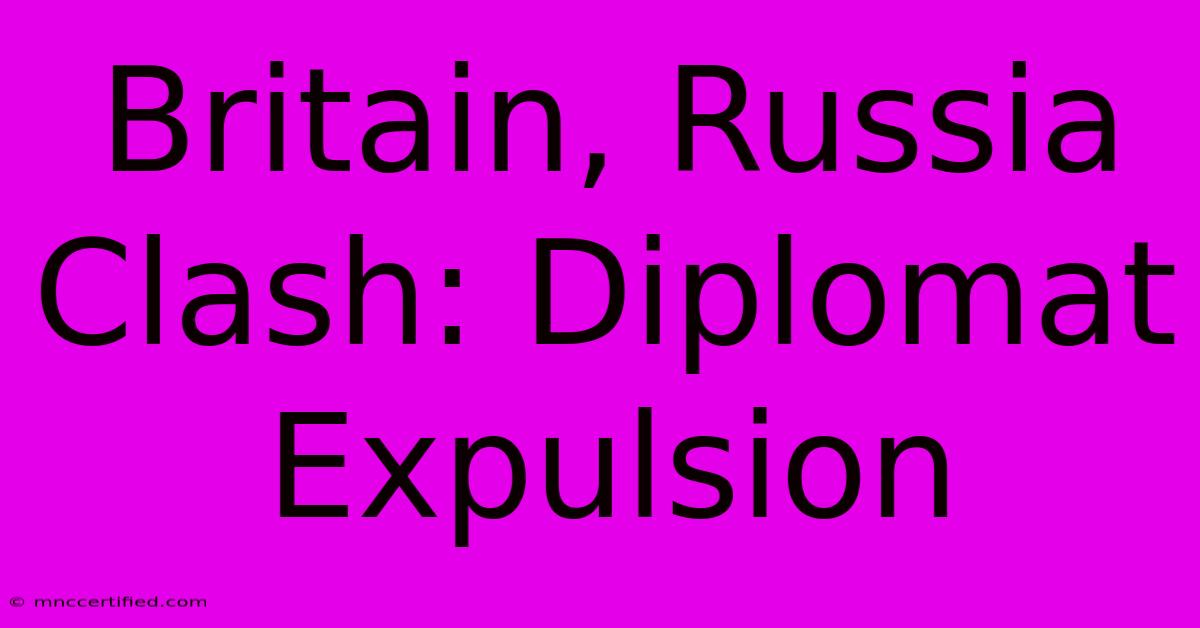Britain, Russia Clash: Diplomat Expulsion

Table of Contents
Britain, Russia Clash: Diplomat Expulsions and the Deteriorating Relationship
The recent expulsion of diplomats by both Britain and Russia marks a significant escalation in the already strained relationship between the two countries. This tit-for-tat action reflects a deeper geopolitical struggle, fueled by accusations of espionage, interference, and differing geopolitical stances. Understanding the context of this diplomatic clash is crucial to grasping the implications for international relations.
The Trigger: Accusations of Espionage and Interference
While the immediate trigger for the latest round of expulsions remains somewhat opaque, it's understood to stem from ongoing accusations of espionage and interference in domestic affairs. Both countries have historically accused each other of such activities, but the current climate of heightened tensions has intensified these accusations. Specific details surrounding the alleged espionage activities are often kept confidential for national security reasons, hindering a complete public understanding of the events. However, the very act of expulsion signifies a serious breach of trust and a significant escalation of the conflict.
The History of Diplomatic Expulsions Between Britain and Russia
The current diplomatic spat is not an isolated incident. The history between Britain and Russia is punctuated by similar events, reflecting periods of heightened tension and distrust. This pattern highlights the cyclical nature of their relationship, characterized by periods of cooperation interspersed with significant clashes. Understanding this historical context is vital for interpreting the current situation and predicting future developments. For instance, recalling previous expulsions can help analyze the scale and significance of the current actions, gauging the potential for further escalation or de-escalation.
The Geopolitical Context: Ukraine, Cyber Warfare, and Beyond
The strained relationship between Britain and Russia extends far beyond individual accusations. The ongoing conflict in Ukraine, allegations of Russian cyber warfare, and differing approaches to international issues all contribute to the tense atmosphere. Britain's strong support for Ukraine, coupled with its sanctions against Russia, stands in stark contrast to Russia's geopolitical ambitions and its denial of involvement in destabilizing actions. This fundamental disagreement forms the backdrop for the recent diplomatic expulsions, making it a symptom of a much larger and more complex conflict.
The Role of International Relations and Alliances
The actions taken by both Britain and Russia have implications far beyond their bilateral relationship. The response from other Western nations, particularly those within NATO, will be closely watched. The expulsions could further solidify alliances and deepen existing divisions within the international community. The potential for further escalations or retaliatory measures from other countries remains a key concern. Analyzing the responses from international bodies and other nations offers valuable insight into the broader geopolitical ramifications of this conflict.
The Implications: Trust, Stability, and Future Relations
The diplomatic expulsions significantly damage the already fragile trust between Britain and Russia. This breakdown in communication and cooperation poses risks to international stability, potentially hindering efforts to address shared global challenges. Rebuilding trust and fostering improved relations will require a significant shift in approach from both sides. The path towards reconciliation remains uncertain, but understanding the underlying causes and ramifications of this latest clash is the first step towards a more peaceful and cooperative future.
Keyword Optimization:
This article uses keywords and variations organically: Britain, Russia, diplomatic expulsions, espionage, interference, Ukraine, geopolitical, international relations, NATO, sanctions, trust, stability. Further optimization could involve analyzing search volume and competition for specific keywords and adjusting accordingly. It also utilizes semantic SEO by incorporating related terms and concepts naturally within the text.
Off-Page SEO:
Off-page SEO strategies would involve promoting this article through social media sharing, outreach to relevant news websites and blogs, and building backlinks from authoritative sources. Guest posting on relevant websites could also help improve the article’s search ranking.

Thank you for visiting our website wich cover about Britain, Russia Clash: Diplomat Expulsion. We hope the information provided has been useful to you. Feel free to contact us if you have any questions or need further assistance. See you next time and dont miss to bookmark.
Featured Posts
-
Walmart Rolls Back Dei Initiatives
Nov 27, 2024
-
Is Morgan Freeman Missing A Hand
Nov 27, 2024
-
Kimpembes 21 Month Ordeal Ends
Nov 27, 2024
-
November 26th Man City 3 3 Feyenoord
Nov 27, 2024
-
Does Insurance Cover Sublocade
Nov 27, 2024